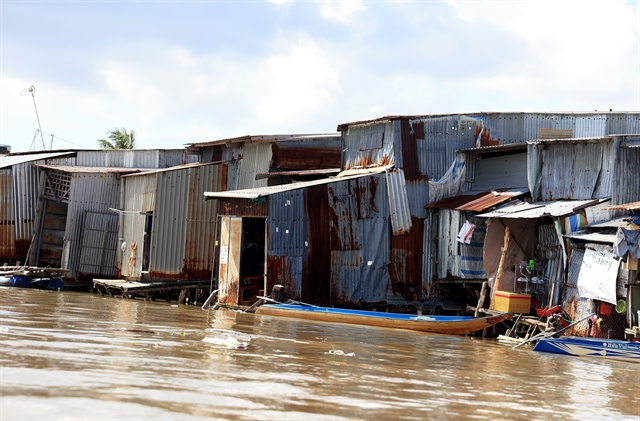 Environment
Environment

Unusual phenomena have become more frequent and have had adverse impacts in the area, including extreme effects of floods and droughts, stronger saline intrusion, degrading ecological environment and aquatic resources as well as increasing coastal erosion.
 |
| Houses in Đầm Dơi District of southern Cà Mau Province are now inches away from the water due to coastal erosion. — VNA/VNS Photo Hồng Đạt |
HÀ NỘI — The Mekong Delta is the largest rice production area in Việt Nam, but adverse impacts from natural and human-induced changes in the Mekong River have led to growing concerns over water security in the region.
With nearly 95 per cent of the river’s flow in the country coming from abroad, the Cửu Long (Mekong) Delta is vulnerable to environmental changes across the region, and especially from hydropower development in the river’s upstream, according to the Deputy Chief of the Standing Office of the Việt Nam Mekong River Commission Nguyễn Hồng Phượng.
The acceleration of these hydropower and irrigation projects for socio-economic goals has resulted in abnormal flow fluctuations and rapidly decreasing silt, sand and nutrients in the delta in Việt Nam.
These unusual phenomena have become more frequent and have had adverse impacts in the area, including extreme effects of floods and droughts, stronger saline intrusion, degrading ecological environment and aquatic resources, as well as increasing coastal erosion.
Not only water-related economic activities, but the livelihoods of millions of locals are also affected, most of whom are in poverty and dependent on resources from the Mekong River.
Phượng added that statistics from 2010 until now also showed that the area’s average rainfall in the dry season dropped by 10-30 per cent, thereby reducing the dry season flow by 5-10 per cent.
Severe droughts were recorded in 2016 and 2020. Coupled with the rising sea level, these resulted in serious saline intrusion that encroached 20-25km deeper into the river compared to the average, she added.
This phenomenon cost Việt Nam’s Mekong Delta approximately VNĐ5.5 trillion (US$223.5 million) in 2015-2016.
Director of the National Centre for Hydrometeorological Forecasting Mai Văn Khiêm also warned that El Nino is expected to affect the region from January to February this year with a probability of over 95 per cent.
This figure will then decrease to around 60-85 per cent from March to May.
The Mekong Delta is likely to experience drought, water shortage and saline intrusion during the dry season in 2024, he said.
“If saline intrusion lasts longer with a high level of salinity, areas along the Tiền and Hậu rivers in Vĩnh Long, Cần Thơ, Bến Tre and Tiền Giang might witness drought and saline intrusion in their rice paddies and fruit orchards,” he added, recommending that farmers need to prepare response plans and be proactive in facing the situation.
Khiêm suggested that Mekong Delta localities must prepare specific plans and solutions to mitigate saline intrusion earlier and more thoroughly.
This is to ensure the water volume for rice production in the winter-spring crop and minimise damage caused by drought and salinity, he said.
Following the Prime Minister’s direction, the Ministry of Natural Resources and Environment has required more frequent forecasts on El Nino, rainfall and river flows from hydrometeorological departments and related agencies.
Phượng also emphasised the necessity of a comprehensive strategy to ensure water security in the Mekong River Basin and particularly the Mekong Delta.
This includes preferential policies for investment and effective use of water, measures to protect and develop water sources, and establishing operating procedures for multi-purpose irrigation infrastructure.
Localities in the area need to proactively respond to forecasts and warnings of changes in the flow from upstream to the delta, while also preparing plans for agricultural production, water storage, maintaining and upgrading water supply structures, and raising awareness on efficient water use among local people, Phượng said.
The deputy chief of the Standing Office of the Việt Nam Mekong River Commission added: “Việt Nam should also enhance its capacity for early warning on the water flows entering the Mekong Delta, alongside communication campaigns for the local community and residents in a practical and timely manner.”
Phượng also highlighted that Việt Nam needs to continue coordinating with other countries in the international Mekong River Commission for the effective execution of the Mekong Agreement for sustainable, fair and reasonable use and management of resources from the river, alongside the Mekong-Lancang Cooperation.
Through these cooperation mechanisms, Việt Nam can promote data sharing, improving analytic and forecasting tools, enhancing capacity for monitoring and research activities, and implementing regulations related to the river and its resources. — VNS




